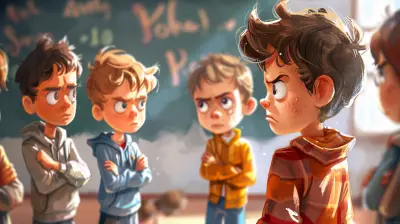The Need for Critical Thinking in Today’s Curriculum
30 May 2025
Introduction
Have you ever wondered why so many students graduate without the ability to analyze problems critically or think independently? In today's fast-paced world, education is supposed to equip young minds with the skills to navigate complexities, yet many curricula still focus on rote learning rather than critical thinking.
In an era of misinformation, social media echo chambers, and rapid technological advancements, critical thinking isn't just a nice skill to have—it's a necessity. But is our education system keeping up with this demand? Let's dive into why critical thinking should be at the core of modern education and how it can shape our future.

What is Critical Thinking?
Before we discuss why critical thinking matters, let's clarify what it actually means.Simply put, critical thinking is the ability to analyze, evaluate, and synthesize information logically and effectively. It involves questioning assumptions, identifying biases, and making reasoned decisions based on evidence rather than emotions or external influences.
Imagine you're scrolling through your social media feed, and you see a post making a bold claim. Do you accept it at face value, or do you pause, question the source, and verify the facts? That moment of contemplation—that's critical thinking in action.
Unfortunately, too many people lack this essential skill, which is why false information spreads like wildfire.

The Problem with Traditional Education
For decades, traditional education has revolved around memorization. Students are taught to absorb information, regurgitate it during exams, and move on. But does this truly prepare them for real-world challenges? Absolutely not.Memorization vs. Understanding
Most educational systems emphasize standardized tests, which often encourage rote learning. Students memorize historical dates, scientific terms, and mathematical formulas without necessarily understanding their real-world applications. When faced with an unfamiliar problem that isn’t in their textbooks, they struggle to apply their knowledge.Lack of Real-World Application
Think about it—how often do we use facts we memorized in school in our daily lives? Instead of focusing on memorization, schools should teach students how to think, not what to think.If students don't develop the ability to question, analyze, and solve problems independently, how can they navigate adulthood, careers, and even basic decision-making effectively?

Why Critical Thinking is a Must in Today’s Curriculum
1. Battling Misinformation in the Digital Age
We live in an era where false information spreads faster than the truth. With the internet giving everyone a voice, it's easy to come across misleading news, biased opinions, or outright lies.Without critical thinking, students may accept every piece of information they see as fact, leading to poor decisions and misconceptions. By incorporating critical thinking into education, we empower young minds to question, fact-check, and form their own well-reasoned opinions.
2. Preparing Students for the Workforce
Employers today aren’t just looking for people who can recall information—they need individuals who can solve problems, think creatively, and make informed decisions.Jobs are evolving, and automation is replacing repetitive tasks. The future workforce will rely more on critical thinking, problem-solving, and adaptability than memorized knowledge. Schools must prepare students for jobs that don’t even exist yet!
3. Enhancing Problem-Solving Skills
Life is full of unexpected challenges. Whether it's choosing a career path, managing finances, or resolving conflicts, critical thinking helps individuals navigate complex situations with confidence.For example, if a student learns to break down a math problem logically instead of blindly following a formula, they develop a mindset that will help them tackle real-life problems with the same analytical approach.
4. Encouraging Independent Thought
Education should not be about blindly accepting what teachers or textbooks say. It should be about learning how to think independently.Encouraging students to question, debate, and analyze different perspectives helps them develop their own opinions rather than simply adopting societal norms without reflection. A society filled with independent thinkers is one that fosters innovation, progress, and meaningful change.

How Can Schools Integrate Critical Thinking?
If critical thinking is so vital, how can schools practically implement it into their curriculum?1. Shift from Memorization to Inquiry-Based Learning
Instead of merely teaching students facts, educators should focus on why things happen. Inquiry-based learning encourages curiosity by allowing students to ask questions, research answers, and form conclusions.For instance, in a history class, rather than memorizing dates and events, students could explore why wars happened, what led to certain movements, and how history impacts the present.
2. Incorporate Debates and Discussions
Healthy debates foster critical thinking. Encouraging students to engage in structured debates forces them to research, listen to opposing views, and defend their stance logically.Imagine a classroom where students debate topics like "Is social media a positive or negative influence on society?" Instead of accepting one perspective, they investigate various sides and form well-rounded conclusions.
3. Teach Logical Reasoning and Problem-Solving Activities
Encouraging students to solve real-world problems through case studies, puzzles, and decision-making exercises sharpens their reasoning skills. Practical problem-solving, rather than textbook exercises, enhances critical thinking.4. Encourage Open-Ended Questions
Instead of asking “What is the capital of France?” educators should pose open-ended questions like:- “How do different cultures influence governmental decisions?”
- “What would happen if we eliminated money as a currency?”
Questions without straightforward answers push students to think deeper and consider multiple perspectives.
5. Introduce Philosophy and Ethics Early On
Most students don’t engage with philosophy or ethics until college, but introducing these subjects earlier can enhance their critical reasoning abilities. If a child learns from an early age to question moral dilemmas and explore different beliefs, they develop a habit of thinking critically throughout life.The Long-Term Impact of Critical Thinking
When students are taught how to think critically from an early age, they grow into adults who are:- Better decision-makers – They assess situations logically before making choices.
- More adaptable – They embrace change and analyze problems effectively.
- Less susceptible to misinformation – They verify facts and question biased narratives.
- More innovative – They think outside the box and develop creative solutions.
In short, embedding critical thinking into education doesn't just benefit individuals—it strengthens society as a whole.
Conclusion
The world is changing rapidly, and education must evolve with it. Critical thinking is no longer optional; it’s essential. If we want to raise a generation of independent thinkers, problem-solvers, and responsible citizens, then we must change the way we teach.Memorized knowledge fades, but the ability to think critically lasts a lifetime. It’s time to prioritize critical thinking in schools and give students the tools they need to thrive in an unpredictable world.
What do you think? Should critical thinking be at the center of modern education? Let us know your thoughts!
all images in this post were generated using AI tools
Category:
Education ReformAuthor:

Anita Harmon
Discussion
rate this article
3 comments
Georgia Klein
Critical thinking empowers students to navigate complexity, fostering adaptability and informed decision-making essential for success in an ever-changing world.
June 13, 2025 at 12:48 PM

Anita Harmon
Thank you for highlighting the importance of critical thinking! It truly equips students with the skills needed to thrive in our complex and dynamic world.
Viva Pratt
Embracing critical thinking in our curriculum empowers students to navigate a complex world with confidence. It fosters creativity, problem-solving, and adaptability—skills essential for success in an ever-changing future. Let's nurture thinkers, not just learners!
June 1, 2025 at 3:25 AM

Anita Harmon
Thank you for highlighting the importance of critical thinking! I completely agree—empowering students with these skills is vital for their success in a rapidly evolving world. Let's continue to prioritize thinking over rote learning!
Bria Kane
Critical thinking is essential in today’s curriculum. It equips students to analyze information critically, make informed decisions, and solve complex problems. Fostering these skills prepares them for the challenges of an increasingly complex world.
May 31, 2025 at 3:17 AM

Anita Harmon
Absolutely agree! Critical thinking not only enhances students' analytical skills but also empowers them to navigate and address the complexities of modern life effectively.



